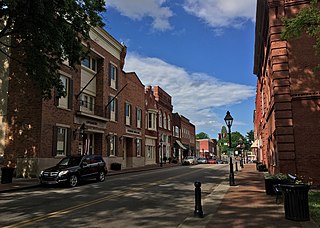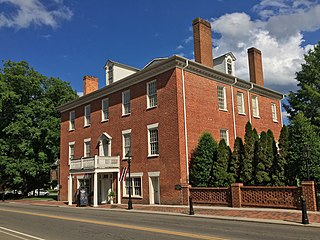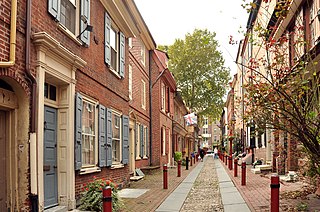
Hawkins County is a county located in the U.S. state of Tennessee. As of the 2020 census, the population was 56,721. Its county seat is Rogersville, Hawkins County is part of the Kingsport–Bristol–Bristol, TN-VA Metropolitan Statistical Area, which is a component of the Johnson City–Kingsport–Bristol, TN-VA Combined Statistical Area, commonly known as the "Tri-Cities" region.

Hancock County is a county located in the northeastern part of the U.S. state of Tennessee. As of the 2020 census, the population was 6,662, making it the fourth-least populous county in Tennessee. Its county seat is Sneedville.

Rogersville is a town in, and the county seat of, Hawkins County, Tennessee, United States. It was settled in 1775 by the grandparents of Davy Crockett. It is named for its founder, Joseph Rogers. Tennessee's second oldest courthouse, the Hawkins County Courthouse, first newspaper The Knoxville Gazette, and first post office are all located in Rogersville. The Rogersville Historic District is listed on the National Register of Historic Places.

Bean Station is a town in Grainger and Hawkins counties in the state of Tennessee, United States. As of the 2020 census, the population was 2,967.
The Rogersville Review is a twice-weekly newspaper publishing in Rogersville, Tennessee, United States.

Overton Lodge No. 5 is a Freemason lodge under the Grand Lodge of Tennessee. Overton Lodge is located on the Courthouse Square in Rogersville Historic District in downtown Rogersville, Tennessee in the United States.

Hale Springs Inn, built in 1824 on the Courthouse Square in Rogersville, Tennessee, was the oldest continuously-operated Inn in Tennessee. It is listed as a contributing property of the Rogersville Historic District.

Ebbing and Flowing Spring is a spring located in Hawkins County, Tennessee, near Rogersville, that is one of only two known springs in the world to exhibit tidal characteristics.

Historic districts in the United States are designated historic districts recognizing a group of buildings, properties, or sites by one of several entities on different levels as historically or architecturally significant. Buildings, structures, objects and sites within a historic district are normally divided into two categories, contributing and non-contributing. Districts greatly vary in size: some have hundreds of structures, while others have just a few.
This is a list of the National Register of Historic Places listings in Knox County, Tennessee.

Joseph Rogers (1764–1833) was an Irish-born pioneer and settler who, with his father-in-law Thomas Amis, founded the town of Rogersville, Tennessee in 1789.

Amis House is a pioneer settlement in Hawkins County, Tennessee near Rogersville, built in 1780–2 by Thomas Amis, the father-in-law of Rogersville founder Joseph Rogers.

The Hawkins County Courthouse is the seat of county government for Hawkins County, Tennessee, United States, located in the city of Rogersville. It was built in 1836, it is one of six antebellum courthouses still in use in Tennessee, and it is the second oldest courthouse still in use in the state.

Price Public Elementary School, now known as Price Public Community Center and Swift Museum, is a former African-American school in Rogersville, Tennessee. It currently serves as a community center and home of the Swift Museum.

Pressmen's Home is a ghost town and former headquarters for the International Printing Pressmen and Assistants' Union of North America from 1911 to 1967, in the Poor Valley area of Hawkins County, Tennessee, United States, nine miles north of Rogersville. It included a trade school, a sanitarium, a retirement home, a hotel, a post office, a chapel, a hydroelectric power production plant, telecommunication utilities, and other facilities designed to make it a self-sufficient community.
The Battle of Rogersville was a conflict in and around the town of Rogersville, Tennessee, on the morning of November 6, 1863, between the United States Army 3rd Brigade, 4th Cavalry Division and the Confederate States Army Jones' Brigade, 2nd Cavalry Brigade and the 8th Virginia Cavalry. Because Federal forces were caught largely by surprise, the Confederates, under Brigadier General William E. Jones, were able to recapture Rogersville along with significant supplies from the town's railroad storehouses.

Tennessee marble is a type of crystalline limestone found only in East Tennessee, in the southeastern United States. Long esteemed by architects and builders for its pinkish-gray color and the ease with which it is polished, this stone has been used in the construction of numerous notable buildings and monuments throughout the United States and Canada, including the National Gallery of Art and the National Air and Space Museum in Washington, D.C., the Minnesota State Capitol, as well as parts of the United States Capitol in Washington, Grand Central Terminal in New York, and Union Station in Toronto. Tennessee marble achieved such popularity in the late-19th century that Knoxville, the stone's primary finishing and distribution center, became known as "The Marble City."

St. Marks Presbyterian Church is a historic African-American church in Rogersville, Tennessee.

John Crockett was an American frontiersman and soldier, and the father of David "Davy" Crockett.

















